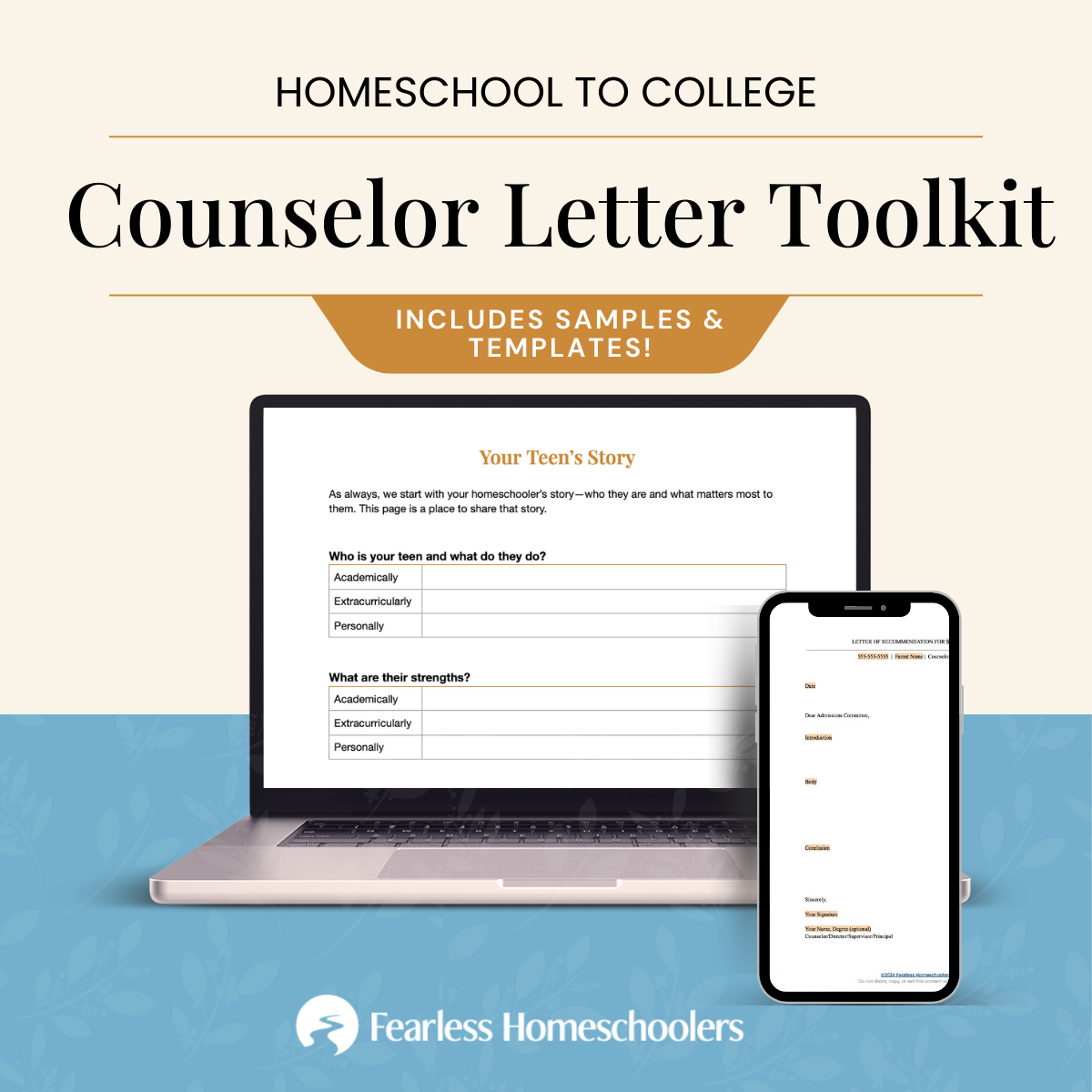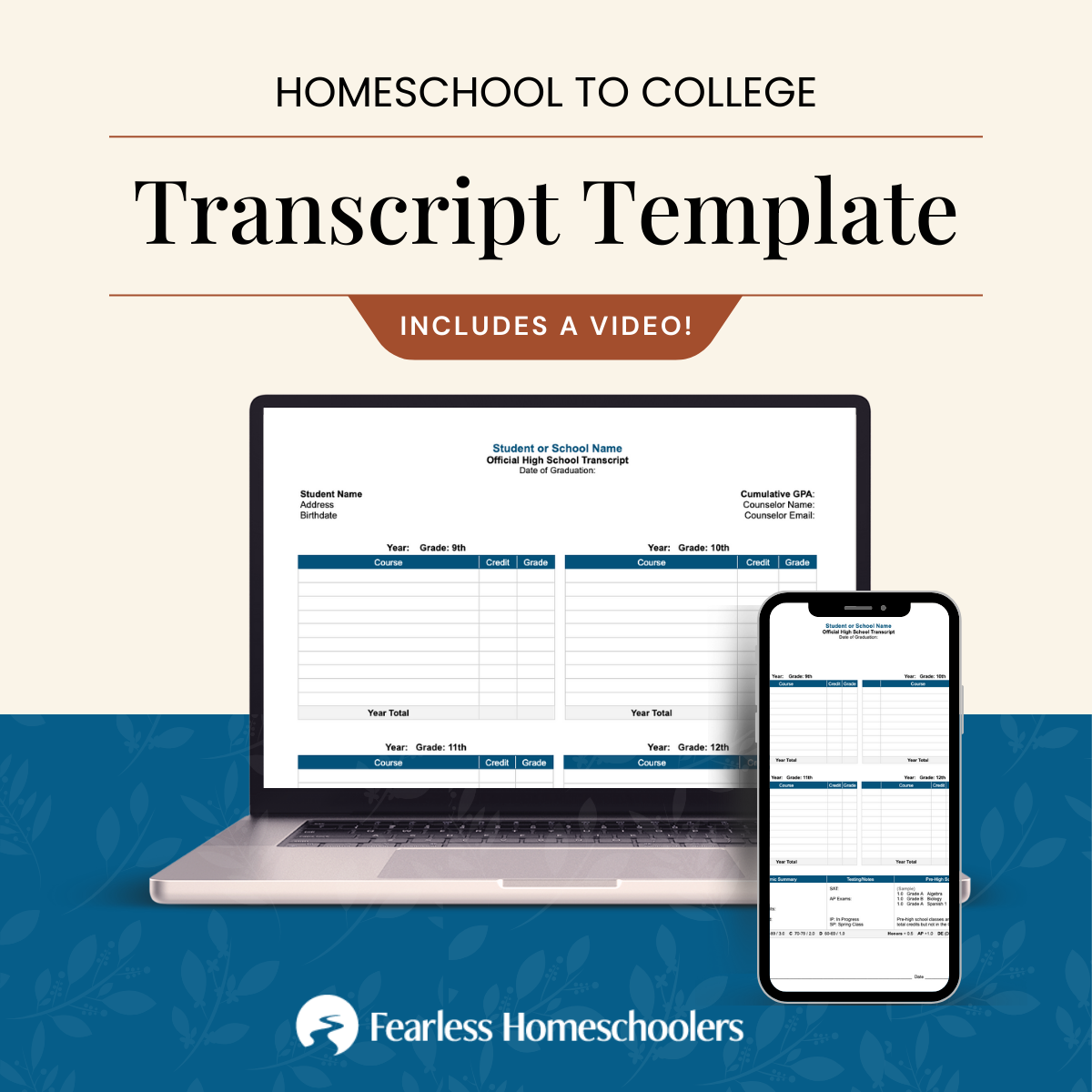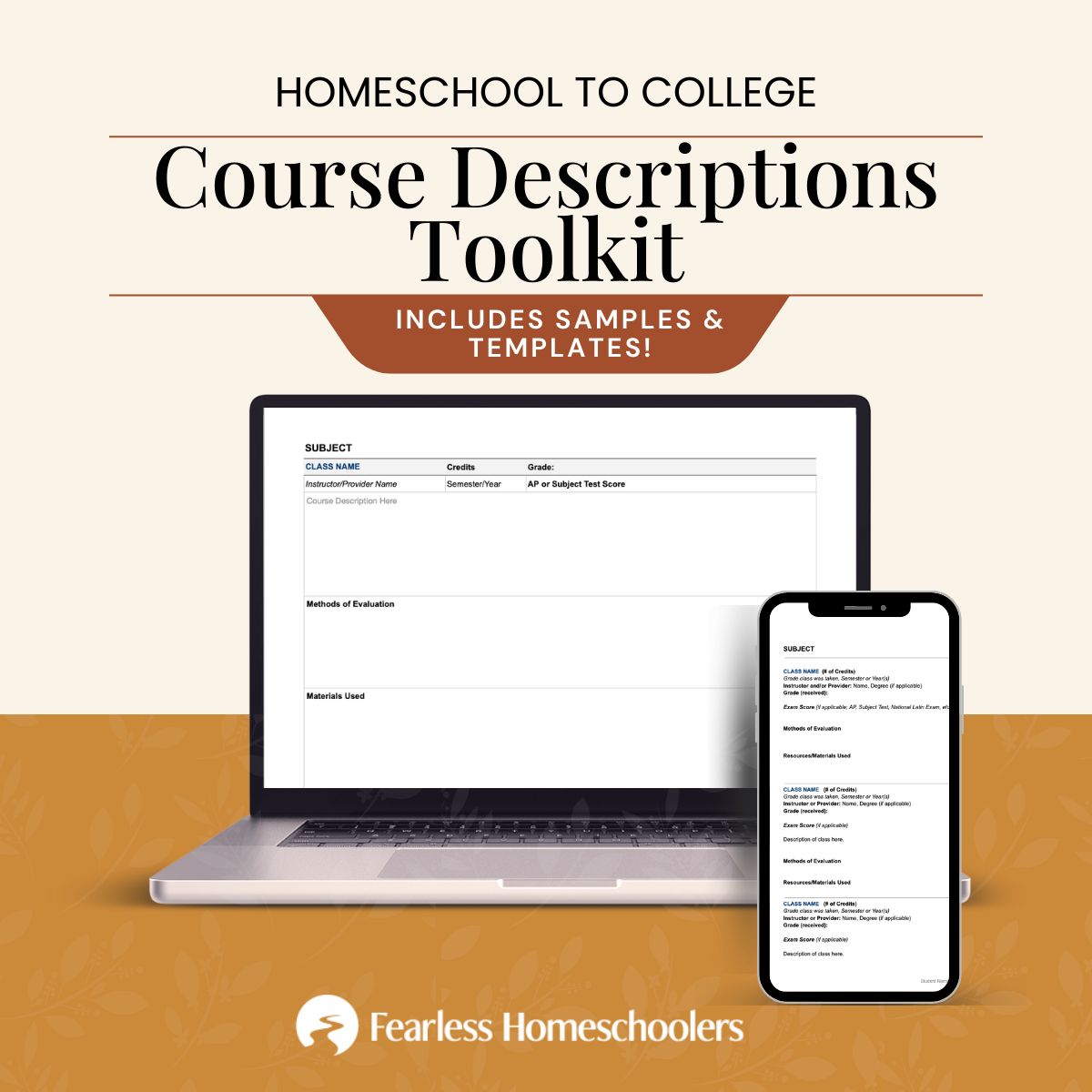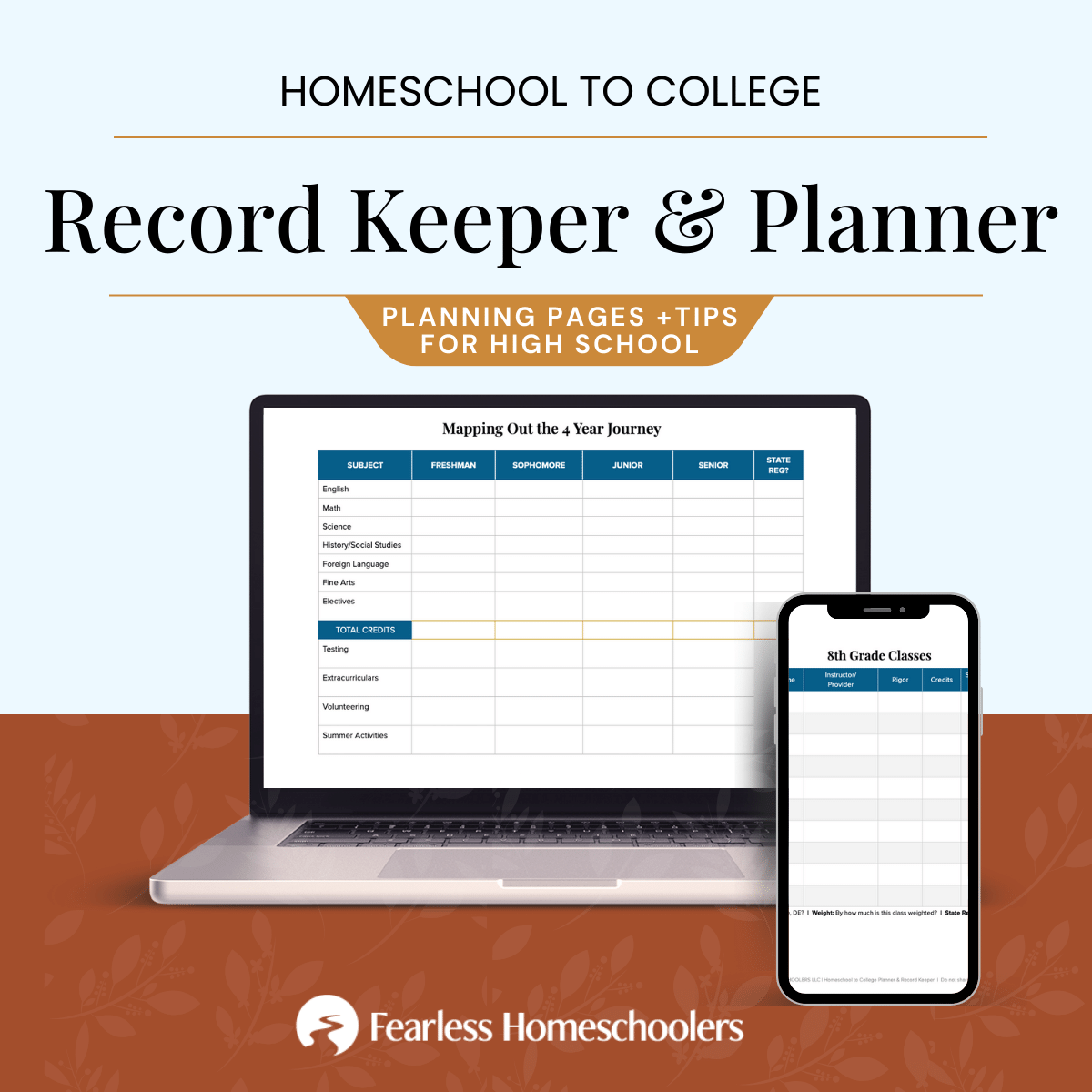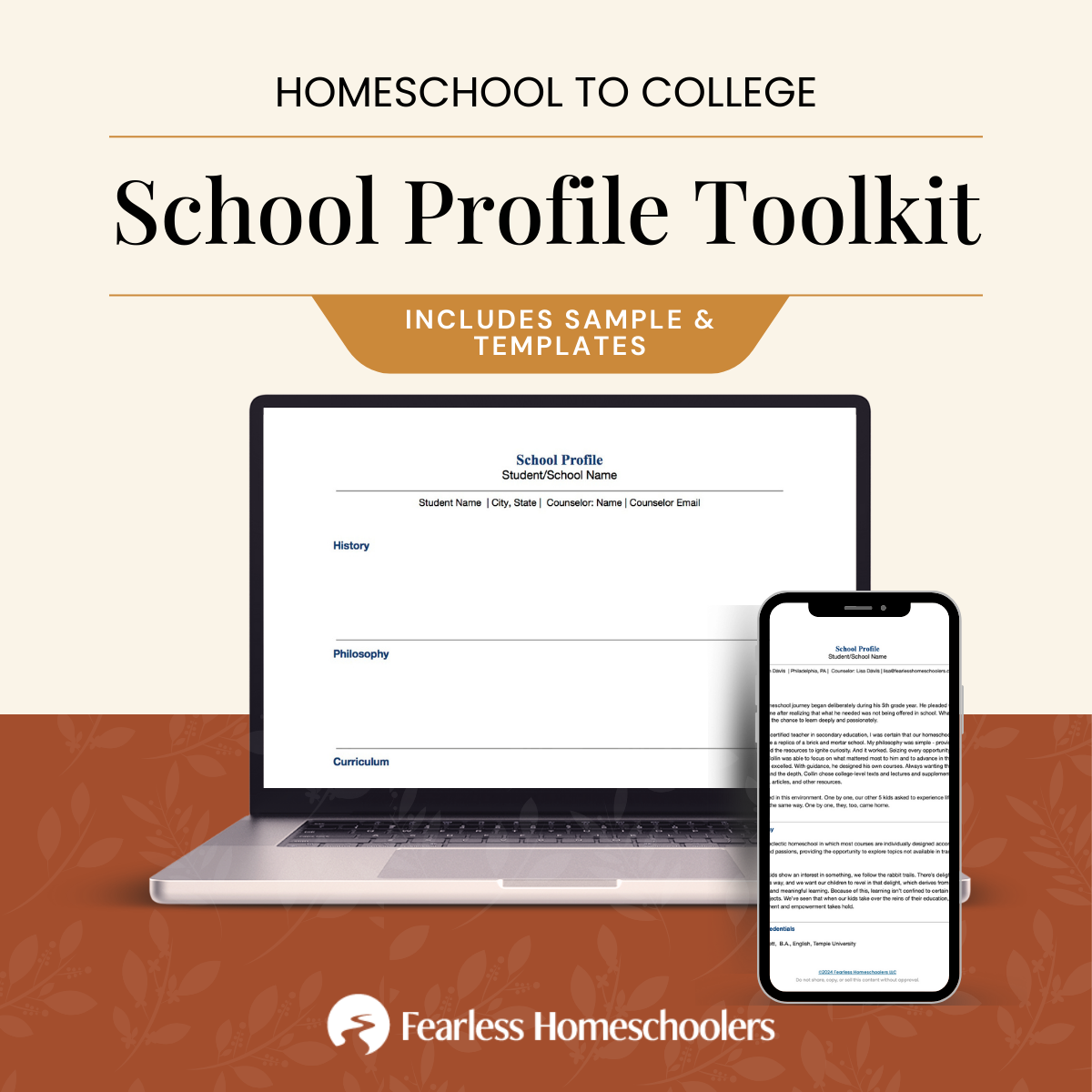How to Write a Homeschool Counselor Letter That Colleges Love
The time has come. You’ve worked through the Homeschool Transcript, School Profile, and Course Descriptions.
There’s only one document left, and it’s the one you’re avoiding, because you just aren’t sure how to approach it.

Write a homeschool counselor recommendation letter that makes your homeschooler stand out in college admissions.
What is the homeschool counselor letter?
The counselor letter is a letter of recommendation submitted to colleges on behalf of an applicant. Traditionally, a school’s guidance counselor submits this letter. But because you, the parent, are the counselor, you’re responsible for writing the recommendation.
For homeschoolers, this is one of four documents you should submit to colleges: transcript, course descriptions, school profile, and counselor letter.
How this will be different for you
The role of a traditional high school counselor in college admissions is clear - evaluate a student within the context of the school community. How do they compare with other students? Did they take the most rigorous of courses offered? What kind of impact did they make on the community, socially and extracurricularly?
Because homeschoolers cannot make these kinds of comparisons, your letter needs to take a different approach.
Your job is to strike a balance between teacher and parent in a professional, yet personal way.
👉 Get more insider tips, samples, and a template with the Counselor Letter Toolkit! Grab it HERE!
Will colleges take my letter seriously?
Yes, most schools will welcome your letter if it adds to the conversation rather than detracts from it.
A warning
You may feel the urge to write a LOT in your letter. I mean, you know your teen better than anyone else. And you poured your heart and soul into their lives and education.
But, please, don’t go overboard. Don’t share every wonderful quality and every heartwarming story. Keep it focused and brief so that your letter will be taken seriously.
First things first
What doesn’t your homeschooler’s college application say…yet?
I often refer to the application as a puzzle. When put together, all of the pieces should reflect everything you want admissions to know.
This is the time to look at the the pieces of the application thus far.
- What do the essays say? What does the activities list say?
- What does the school profile say?
- Now ask yourself, “What doesn’t this application say yet about my child?”
Three Questions You Should Be Asking
1. What is missing academically?
If you feel that the transcript doesn’t have the academic rigor of APs and test scores, provide evidence of intellectual curiosity and examples of independent projects.
If you want to compare students of similar age and you have the credentials or experience to do so, explain in detail. Discuss your child’s development.
If they were the one who asked to come home, why? Did the reasons change or evolve or grow? How did the student grow over time?
Consider these academic qualities of your student:
- What motivates them?
- What intellectual risks have they taken?
- What excites them?
- How do they show initiative?
- How have they taken advantage of homeschooling?
2. What is missing extracurricularly or socially?
Ah, the Elephant in the Room.
Unfortunately, there’s still a stigma attached to being a homeschooler. Although the number of homeschoolers is rapidly increasing and institutions are becoming increasingly accommodating, negative stereotypes still exist.
Take this opportunity to discuss one of their social strengths within the context of groups, leadership roles, and community activities.
3. What is missing about their character?
More than ever before, colleges want to know WHO their applicants are. What kind of human are they? What kind of human will they be on their campus? And what kind of human do they want to be in this world?
Reveal your teen’s positive qualities through anecdotes and examples.
Note: It’s always good to quote someone else or even the student to support their character and values. Be sure to back those quotes up with specific examples.
The Most Important Thing to Remember
This is a story. Not a resume.
Go through the writing process as if you are writing one of the most important essays of your life. Not only does this guarantee empathy for your child as they write their essay (!), but will also provide insight for how to craft your letter.
This should not be a list of accomplishments.
Note: This letter is about the student. While there may be slight overlap with the School Profile in explaining a student’s reasons to be homeschooled, this letter is reserved to provide insight about the student.
👉 Get more insider tips, samples, and a template with the Counselor Letter Toolkit! Grab it HERE!
How to Begin
Think of a few positive traits that capture who your child is - something that is not yet in the application.
If it helps, choose one academic trait, one social/extracurricular trait, and one personal character trait. Or you can come up with three other ideas that provide a skeleton.
1. Introduction
After beginning your letter with, “Dear Selection Committee,” declare your recommendation: “It is with great honor that I submit this recommendation for…”
Make sure your next sentence or two has impact. For schools with a large pool of applicants, admissions officers tend to read the beginning and end. They skim through the middle. Pull in the reader with powerful beginning sentences.
If you have teaching credentials, mention them now and explain how your child compares.
Briefly mention why the student came home and how they took advantage of homeschooling, but go straight to the heart of your homeschooler. What makes them special?
2. Body
Weave personal stories and positive character traits together. Breathe life into the application, balancing professionalism with details only a parent would know. Show how your child balanced academic interests with other interests. Give details into your child’s real life, real bedroom, real friends.
Focus on your homeschooler’s academic, social, and personal qualities. Back them up with stories, examples, and quotes that you’ve kept in your high school records.
3. Conclusion
Finish with clarity and certainty. How will the aforementioned qualities be used in the future, on campus, and in the world?
Finish strong: “I have no doubt that [homeschooler’s name] will be an asset to your undergraduate community and I am therefore very pleased to be able to recommend them for admission.”
Need examples? Happy to oblige!
To him, the world is filled with wonder; there is so much to learn and so much to do. He has a wall-sized whiteboard in his room. On it, you will often find math problems juxtaposed with a list of personal inquiries, such as “What are my worst qualities, and what can I do to improve them?”
Not only have I watched her make bold and authentic choices, whether it be homeschooling or standing up for classmates who are bullied, but I have watched her persevere when the realities of life conflicted with her dreams.
During these setbacks, she immersed herself in the newfound knowledge and passion inspired by her women’s study. The writings and lessons of Mary Wollstonecraft to Virginia Woolf to Gloria Steinem embodied a strength and purpose that resonated with her, as she faced those setbacks. Her interest then broadened into other social justice issues, such as institutionalized racism, animal rights, and gender equality.
The Homeschool Counselor Letter Checklist
- Name of Student
- Common App or Application ID#
- Counselor Signature
- Counselor Title
- Dear Selection Committee
- Strong Beginning
- Positive traits or values backed up by examples or anecdotes
- A quote from homeschooler or outside source
- Strong Finish
FAQs
1. How long should my counselor letter be?
One to one and a half pages is ideal here. Write it in simple block format. No need to add addresses here unless you have the space.
2. Should I put this on letterhead or include my homeschool name?
Nope. No need for either unless you’re inclined to do so.
3. What if I’m not a good writer?
Write the letter using bullet points! Admissions officers will love the brevity and refreshing style.
Where Do I Upload This in the Common App?
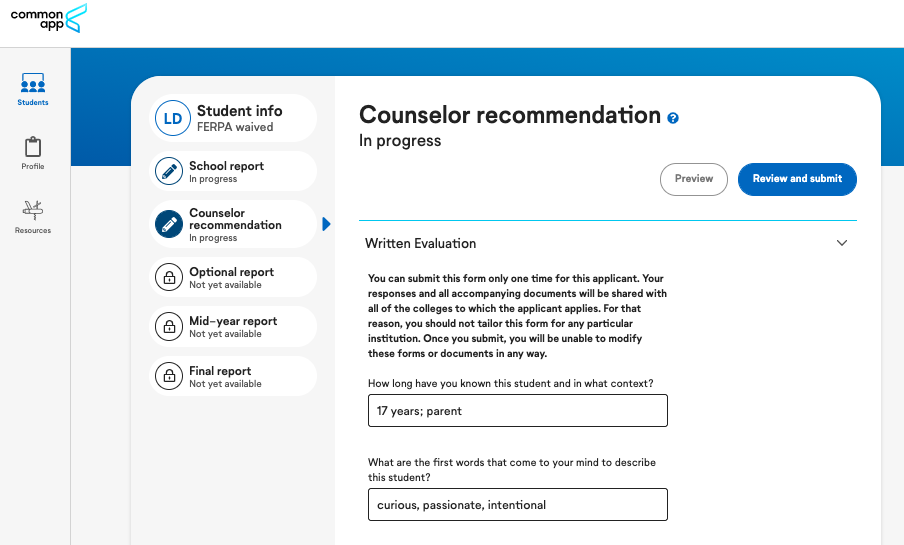
- In your Common App Counselor Account, select “Students” in the left sidebar. Click on your homeschooler’s name.
- Once you’re in your homeschooler’s section, click on “Counselor Recommendation” in the left sidebar.
- There, you will find a couple of questions and a place to upload your letter of recommendation. While there is a place to write within a textbox, I highly recommend you upload a pdf.
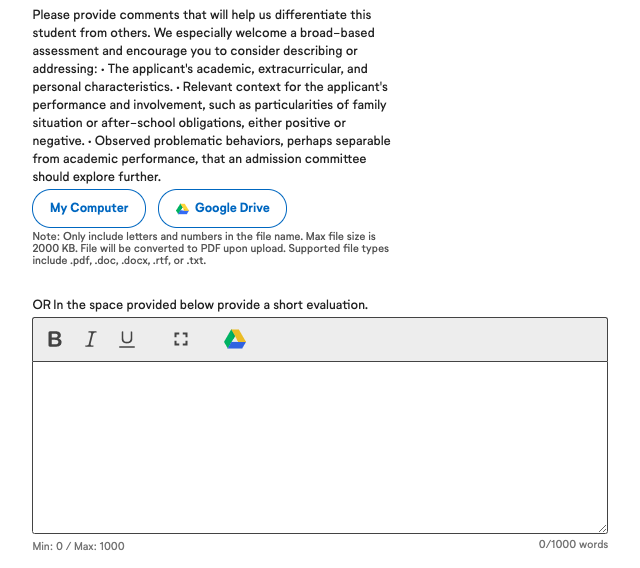
The Good News
Writing your letter will be a deeply powerful and moving experience, as you journey into your child’s past, revisiting all that they have done and all that they have become. You will take stock of a family who chose an unconventional path, and you will relive moments of joy.
You have the honor to present your student in a way most parents do not. Embrace this opportunity and enjoy this moment in your life.
This is not only a time to celebrate your kid, but also a time to congratulate yourself for a job well done!
👉 Get more insider tips, samples, and a template with the Counselor Letter Toolkit! Grab it HERE!
Want More on Homeschool Documents?
- How to Navigate the Common App as a Homeschooler
- How to Create Homeschool Course Descriptions That College Love
- How to Write Your School Profile as a Homeschooler
Your Turn
What’s the hardest part about writing the counselor letter? Share in a comment below!
